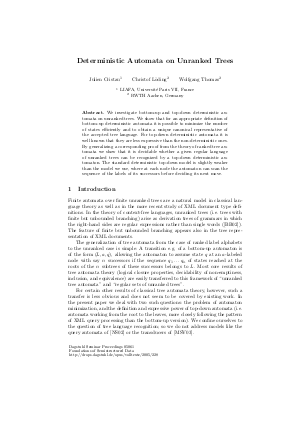Deterministic Automata on Unranked Trees
Authors Wolfgang Thomas, Julien Christau, Christof Löding
-
Part of:
Volume:
Dagstuhl Seminar Proceedings, Volume 5061
Part of: Series: Dagstuhl Seminar Proceedings (DagSemProc) - License:
 Creative Commons Attribution 4.0 International license
Creative Commons Attribution 4.0 International license
- Publication Date: 2005-08-10
File

PDF
DagSemProc.05061.3.pdf
- Filesize: 190 kB
- 12 pages
Document Identifiers
Subject Classification
Keywords
- Automata
- unranked trees
- parikh automata
Metrics
- Access Statistics
-
Total Accesses (updated on a weekly basis)
0Document
0Metadata
Abstract
We investigate bottom-up and top-down deterministic automata on unranked trees. We show that for an appropriate definition of bottom-up deterministic automata it is possible to minimize the number of states efficiently and to obtain a unique canonical representative of the accepted tree language. For top-down deterministic automata it is well known that they are less expressive than the non-deterministic ones. By generalizing a corresponding proof from the theory of ranked tree automata we show that it is decidable whether a given regular language of unranked trees can be recognized by a top-down deterministic automaton. The standard deterministic top-down model is slightly weaker than the model we use, where at each node the automaton can scan the sequence of the labels of its successors before deciding its next move.
Cite As Get BibTex
Wolfgang Thomas, Julien Christau, and Christof Löding. Deterministic Automata on Unranked Trees. In Foundations of Semistructured Data. Dagstuhl Seminar Proceedings, Volume 5061, pp. 1-12, Schloss Dagstuhl – Leibniz-Zentrum für Informatik (2005)
https://doi.org/10.4230/DagSemProc.05061.3
BibTex
@InProceedings{thomas_et_al:DagSemProc.05061.3,
author = {Thomas, Wolfgang and Christau, Julien and L\"{o}ding, Christof},
title = {{Deterministic Automata on Unranked Trees}},
booktitle = {Foundations of Semistructured Data},
pages = {1--12},
series = {Dagstuhl Seminar Proceedings (DagSemProc)},
ISSN = {1862-4405},
year = {2005},
volume = {5061},
editor = {Frank Neven and Thomas Schwentick and Dan Suciu},
publisher = {Schloss Dagstuhl -- Leibniz-Zentrum f{\"u}r Informatik},
address = {Dagstuhl, Germany},
URL = {https://drops.dagstuhl.de/entities/document/10.4230/DagSemProc.05061.3},
URN = {urn:nbn:de:0030-drops-2281},
doi = {10.4230/DagSemProc.05061.3},
annote = {Keywords: Automata, unranked trees, parikh automata}
}
